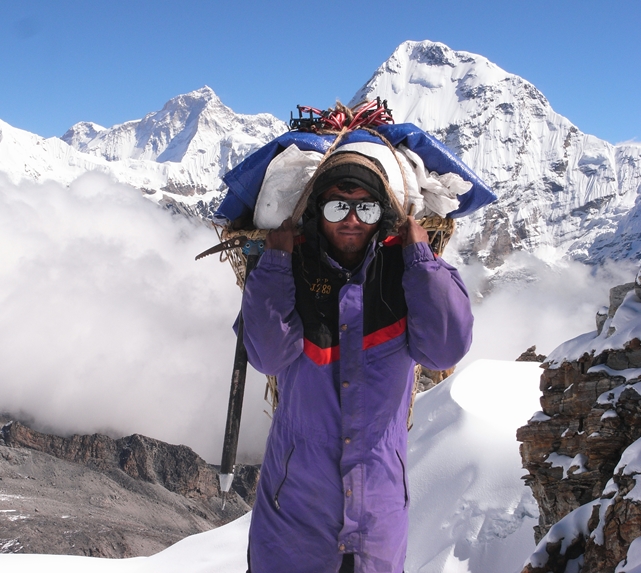“I’ve decided something: Commercial things really do stink. As soon as it becomes commercial for a mass market it really stinks.” – Andy Warhol
We live in a consumer society. Supply and demand, demand and supply. This is our world, and it is spreading rapidly from West to East. And in this burgeoning capitalist world, increasing numbers of people believe that it’s their right to consume: money can buy whatever you want. Yes. I prefer to live in a capitalist society but I am appalled by the current belief that money can buy mountain dreams, bypassing the long learning curve required to climb with self-reliance in the greater ranges. The greatest assets a person can own are their experiences – it is the hard-won memories from these experiences that are our lasting rewards.
The damage inflicted on mountaineering by the present fast-track-summit-fever is deep rooted. The environmental damage caused by the high numbers of people – clients, porters, Sherpas and support staff – who are involved in large group commercial mountaineering is well documented. But there are other, more subtle but just as devastating, knock-on effects.
There is the creeping monopolisation of certain mountains, where individual, self-reliant climbers are increasingly seen as an unwelcome hazard. I have actually heard commercial expedition leaders claim that independent unguided climbers – using no oxygen, climbing without fixed ropes or Sherpa support – are “jeopardising the chances of their paying clients reaching summits”. Will there come a time when alpine-style climbers are forbidden to climb mountains in the greater ranges on the grounds of their style being reckless, or simply unprofitable? We need to consider that question very seriously: consumerism is frighteningly powerful at appropriating, that is what it does best.
Another, less understood, by-product of the modern adventure tourist trade is the cheapening of something that remains profoundly important to dedicated climbers. I’m regularly told (by non-climbers) that Everest is no longer difficult to climb and, in settled weather, I’d have to agree. It’s a great shame that this mountain has been reduced to a holiday destination. But take away the fixed rope, the ladders, the oxygen and Sherpa support, and Everest will once again become a real challenge; the only people summiting will be true climbers.
Mountaineering must be one of the few sports cultures in which people are threatened by standards progressing, a culture where people scream of elitism when the standard improves to a level they are not willing to aspire to. Reinhold Messner climbed Everest twice without supplementary oxygen: first in 1978 and in then 1980 (this time solo and without pre-placed camps). Robert Schauer and Wojciech Kurtyka’s 1985 pure alpine style ascent of Gasherbrum IV’s West Face set new standards and proved what’s possible when two people trust each other. In 1986, Erhard Loretan climbed Everest in 43 hours, moving through the night and without the use of supplementary oxygen. With all that for us to be proud of, why is mountaineering culture still advocating a style of ascent that is thirty years out-of-date, the old style of siege and oxygen, literally lowering the level of the challenge until it’s achievable by anyone?
In Britain, ethics and good style in rock climbing are not frowned upon, in fact they are revered. So why is maintaining good style in the mountains any different? If I took performance-enhancing drugs and then chipped, bolted and aided my way up a classic rock climb like Cenotaph Corner then I would be castigated as a cheat and a vandal, and rightly so. There will be a good many honest climbers who will never climb Cenotaph Corner, it will remain beyond their ability, but they will not cry elitism and demand fixed ropes because they feel that it’s they deserve to stand at the top. True climbers desire only to earn the right.
This is where our western way – of wanting what others have, but not being prepared to put in the time and effort – really fails. Despite the actual dangers that exist for everyone, mountains are now believed by many to be mere commodities. There is the absurd belief that you can ‘pay safe’. Mountains are now sold to highest bidders who, in many cases, have no understanding of what and who came before them, no hard-won experience through which to meet the mountains they wish to ‘conquer’. And it still amazes me that there are people who actually believe that they can conquer billions of tons of mountain, that it’s a trophy to be put on a mantelpiece and bragged about, a mere rung on their career ladder.
Why shouldn’t the wild mountains remain as sanctuary for those who are willing, with reverence, to sacrifice and commit? Why shouldn’t the mountains be preserved as a remote arena where people who want to improve on previous standards can be free to try? Why should the mountains become the domain for the select few who can pay? Someone, please answer these questions, have a go at answering them with integrity.
In the past, I’ve been accused of ‘elitism’ because I voice my opinions and climb to the very best of my abilities. But the Oxford Dictionary defines elitism as ‘reliance on the leadership or dominance of a select group’. I do not rely on the ‘dominance of a select group’, nor do I put myself forward as a ‘dominant leader’, I go in to the mountains on my own or as an equal to my partner.
‘Elite’ (without the ‘ism’) is very a different word. It means ‘the best’. In that sense, true mountaineering – depending on ultimate experience and skills – is inherently elite. All walks of life have elites. I don’t expect to be able to drive a bus, manage a bank or perform an operation on a patient. So why do some people climb into some of the most hostile environments in the world, with poor skills and little experience, and then accuse the people who question this foolishness as being elitist?
Mountain Guides are an elite. They are professional, well-trained people but caught in a storm high on a Himalayan hill it is impossible to guide in the true sense. It’s grossly irresponsible to take people with limited experience above 8,000m. In a high Himalayan storm, death or survival quickly become the only options, it cannot be anything other than each for themselves, and only those with enough personal experience stand any chance of escaping alive.
This raises the profound ethical and moral issues involved with ascents that utilise the services of indigenous people. Nepal is a developing country. Most people’s lives are simply about basic survival and the few Sherpas who are employed for their services do make good money for their families, so who can begrudge them? For me, the most important moral question is: are the clients of the commercial outfits happy to ignore the dangerous, and often lethal circumstances, in which these people work for their livelihoods? Fixing rope on avalanche-prone slopes and repeated carries through dangerous icefalls is not something ‘pay-safe’ Westerners are prepared to do – why do they expect another person to do it for them? Personally, I would never forgive myself if someone died to satisfy my desire to ‘conquer’ a hill.
An inexperienced client who utilises the services of Sherpas also brings about a situation of ignorant dependence: they are placing their life in the hands of a stranger. Occasionally, individual Sherpas will not live up to their collective reputation and the client will scream about being let down, even conned. As in all walks of life, you will get some good, some bad, some indifferent, some excellent, some experienced and some green. It takes experience to recognise that.
Sherpas are human. They are prone to becoming frightened and confused like any other human. Their flesh will freeze and their bones will break as easily as yours or mine. They cry, sweat and fall ill. They suffer with altitude sickness and they think of their loved ones; they are afraid to die. So I have a message to any disgruntled Sherpa client out there: if you feel let down by someone you’ve paid, because in the end they refuse to risk their life for you, then I suggest you learn more, practice hard and get some self-reliance.
The people most respected in life are the ones prepared to sacrifice for their passion and beliefs. I believe you should chase the mountain dream for the good reasons: the love of the special environment; the passion and the challenge; the opportunity to really see yourself, your weakness and strength, and what you could be; and the intensity of experience: the hurt, discomfort, bewilderment, hope, frustration, terror, elation and awe. Mountains are to be dreamed and fantasised about. Sometimes the dream will materialise, often it will not. Each mountain experience should be for individuals, each experience should differ and the outcome should always be uncertain.
My viewpoint is not popular these days. The masses and the mass media do not see or understand the truth of commitment and hard-won skills; the masses see the oldest, the youngest, the quickest, they consume reality TV, and support ‘charity events’. This circus is what most of the general public think mountaineering is, and when this show runs into trouble they scream for government control, rules and regulation. The insurance companies love this; they are waiting, hoping.
True mountaineering can survive, but only with a continual questioning of style, performance and motivation. To truly meet the mountain, you have to cut to the quick and always ruthlessly question your motivations. Don’t try and deceive yourself; for a mountaineer, integrity is paramount.
So let us take down all of the fixed rope, the rubbish, the camps, the ladders and the bolts. Let’s show the world what we think of our mountain environment and how we care about it. Let us not employ people to climb the mountain for us. Let us meet the mountain and climb it by fair means, learn about ourselves and celebrate our achievement when we find success. And, when it’s just too difficult to climb the mountain in good style, let us be humble and accept in life that there will always be places we are not good or experienced enough to reach. Yet we know, with celebration, that it is those impossible places that inspire us to strive.








You say “My viewpoint is not popular these days.”. It should be….excellent piece of writing and bang on.
On a slightly different topic I recently bought Great Escape. Devoured it in a couple of days. The story resonates with me….I’d been a climbing weekend warrior but wanted more from it and me. Almost two years ago I walked away from my full-time job to climb as much as possible. Best thing I ever did for myself.
Excellent written.
The truth is so easy to understand for those that understand what it is all about to climb a mountains.
For the rest of the mass media drunk society it is just amazing to see the “incredible performance” the folks on Everest holiday trips do achive. Nobody cares about climbing ethics, sacrifice and commitment to achive such a goal in pure alpine style by fair means.
Since I started climbing a new fascinating world opened and changed my world completely.
Absolutely true and correct everything you wrote.
I know that, currently in Nepal, small expeditions on secondary objectives have problems to be carried out because the country prefers to issue permits to commercial expeditions for higher peaks (more profitable), discouraging independent mountaineers. Money always creates problems (especially for those who don’t have it:-)!